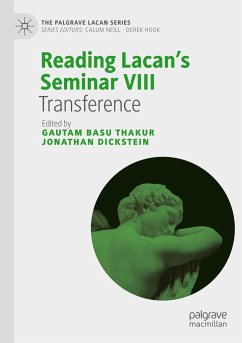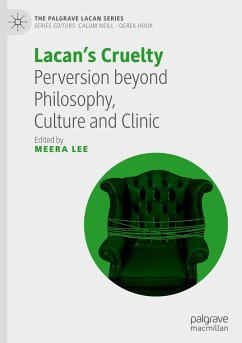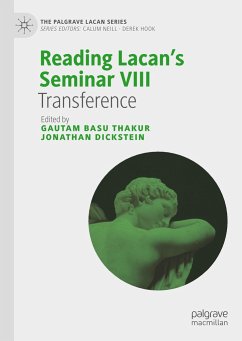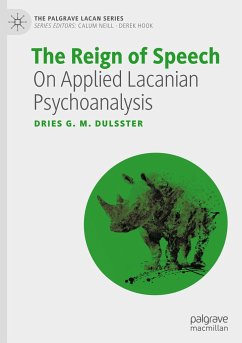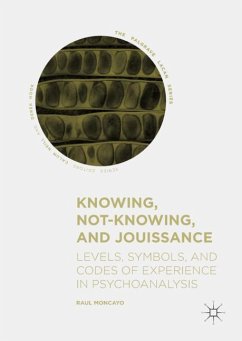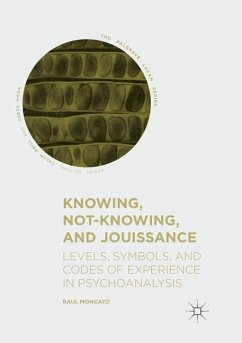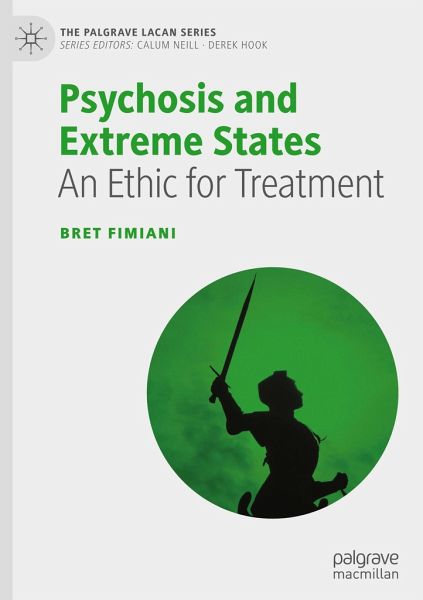
Psychosis and Extreme States
An Ethic for Treatment
Versandkostenfrei!
Versandfertig in 6-10 Tagen
91,99 €
inkl. MwSt.
Weitere Ausgaben:

PAYBACK Punkte
46 °P sammeln!
"This brilliant and beautifully written book invokes a radical reorientation of the treatment of psychosis" Juliet Flower MacCannell, Author of Figuring Lacan and The Hysteric's Guide to the Future Female Subject."Bret Fimiani's book offers an illuminating presentation of the Lacanian approach to psychosis thanks to his clear style which presents Lacanian concepts with a wonderful accuracy, illustrated by examples from his psychoanalytic practice. The dynamic of his investigation challenges the fear of psychosis with testimonies of lived experiences, the Hearing Voices Network, and analysts wh...
"This brilliant and beautifully written book invokes a radical reorientation of the treatment of psychosis" Juliet Flower MacCannell, Author of Figuring Lacan and The Hysteric's Guide to the Future Female Subject.
"Bret Fimiani's book offers an illuminating presentation of the Lacanian approach to psychosis thanks to his clear style which presents Lacanian concepts with a wonderful accuracy, illustrated by examples from his psychoanalytic practice. The dynamic of his investigation challenges the fear of psychosis with testimonies of lived experiences, the Hearing Voices Network, and analysts who claim the unclaimed intelligence at work in psychosis."
Francoise Davoine, co-author of History Beyond Trauma
This book advances a theory of transference-in-psychosis with the aim of provoking a change in the way the experience of psychosis is understood and thus, clinically treated. It examines the function of 'ethics' in the 'installation' of transference in the treatment of psychosis and contends that the aim of the psychoanalytic experience is the creation of a new ethic for the analysand and for the treatment. Beginning from the premise that the body of the psychotic is a site of social contestation, the author draws upon the work of Freud, Lacan, Deleuze & Guattari and Apollon to reframe the problem of the 'body' (as an effect of language) and its relation to transference, and ethics, in treating psychosis. It argues that psychosis still has much to teach psychoanalysis about how psychoanalysis must continue to change in order to create/offer an approach that is effective for psychosis (versus neurosis) and provides a comprehensive psychoanalytic theory of psychosis that derives, at its core, from the experience of psychosis itself. The book's synthesis of clinical and 'peer model' principles will provide readerswith a way to understand and navigate potential transference impasses often encountered with purely clinical approaches. In doing so it provides a valuable new framework for practitioners and scholars working in clinical psychology, psychoanalysis, philosophy, critical theory, psychiatry and social work.
"Bret Fimiani's book offers an illuminating presentation of the Lacanian approach to psychosis thanks to his clear style which presents Lacanian concepts with a wonderful accuracy, illustrated by examples from his psychoanalytic practice. The dynamic of his investigation challenges the fear of psychosis with testimonies of lived experiences, the Hearing Voices Network, and analysts who claim the unclaimed intelligence at work in psychosis."
Francoise Davoine, co-author of History Beyond Trauma
This book advances a theory of transference-in-psychosis with the aim of provoking a change in the way the experience of psychosis is understood and thus, clinically treated. It examines the function of 'ethics' in the 'installation' of transference in the treatment of psychosis and contends that the aim of the psychoanalytic experience is the creation of a new ethic for the analysand and for the treatment. Beginning from the premise that the body of the psychotic is a site of social contestation, the author draws upon the work of Freud, Lacan, Deleuze & Guattari and Apollon to reframe the problem of the 'body' (as an effect of language) and its relation to transference, and ethics, in treating psychosis. It argues that psychosis still has much to teach psychoanalysis about how psychoanalysis must continue to change in order to create/offer an approach that is effective for psychosis (versus neurosis) and provides a comprehensive psychoanalytic theory of psychosis that derives, at its core, from the experience of psychosis itself. The book's synthesis of clinical and 'peer model' principles will provide readerswith a way to understand and navigate potential transference impasses often encountered with purely clinical approaches. In doing so it provides a valuable new framework for practitioners and scholars working in clinical psychology, psychoanalysis, philosophy, critical theory, psychiatry and social work.






